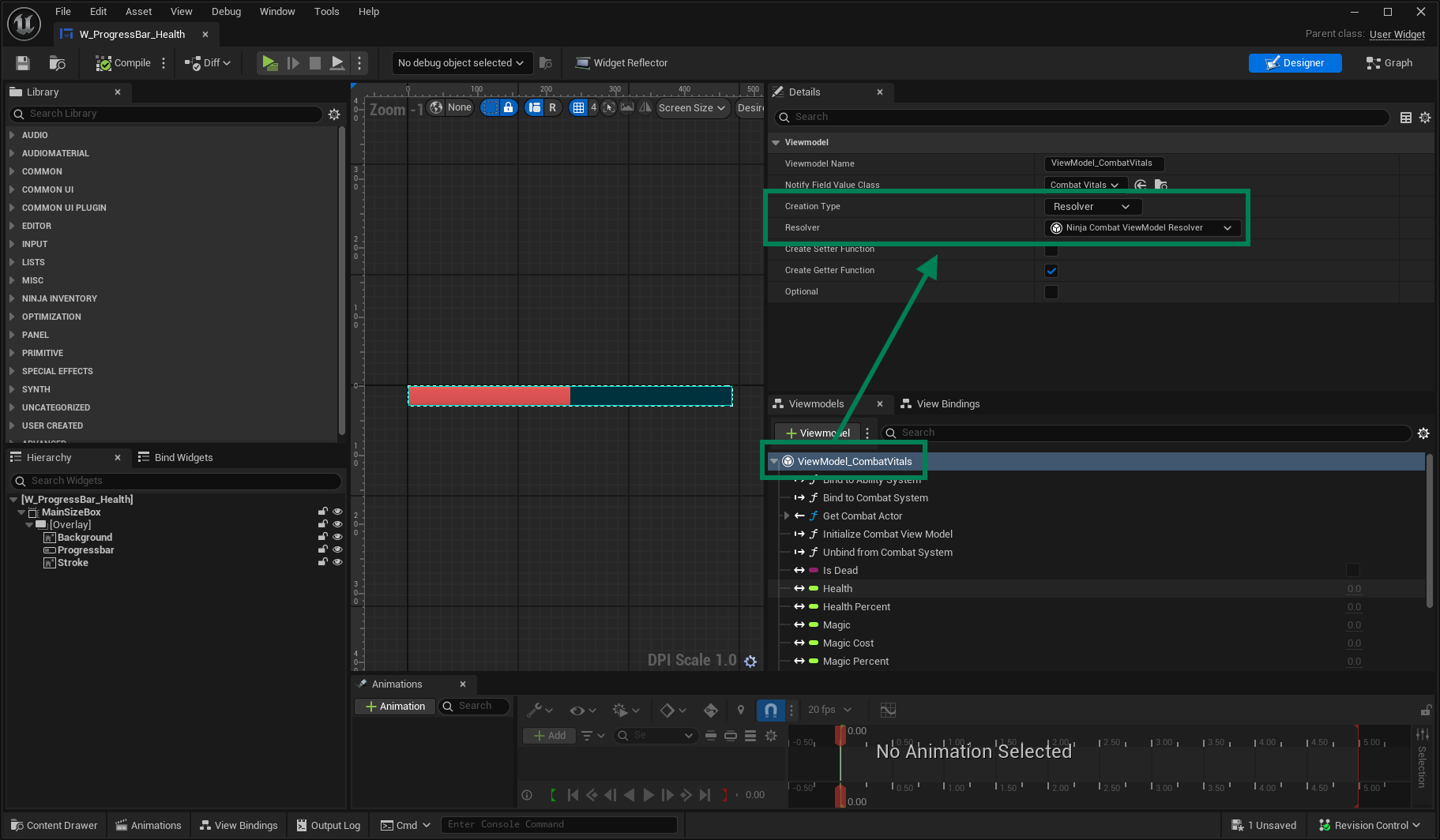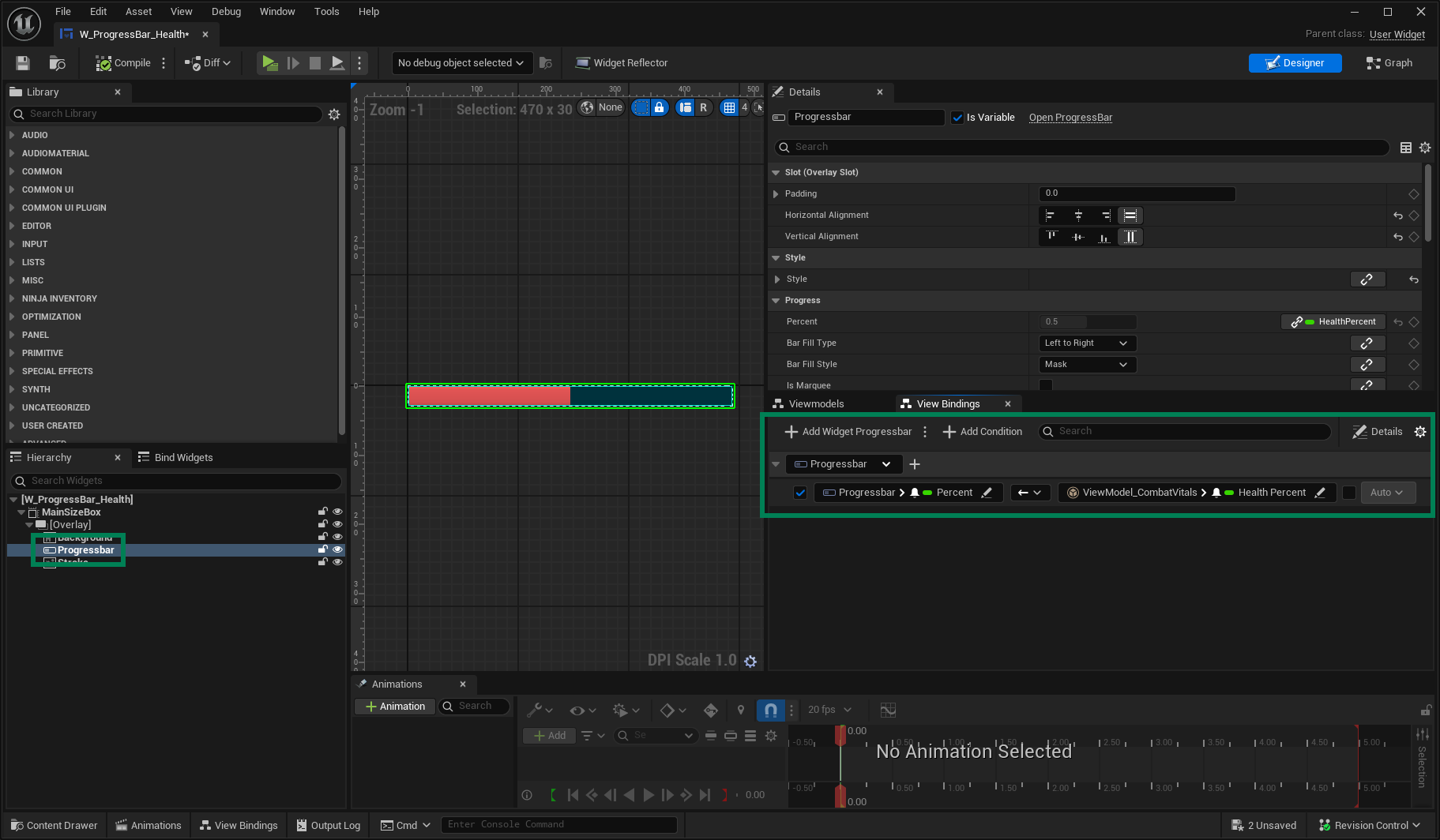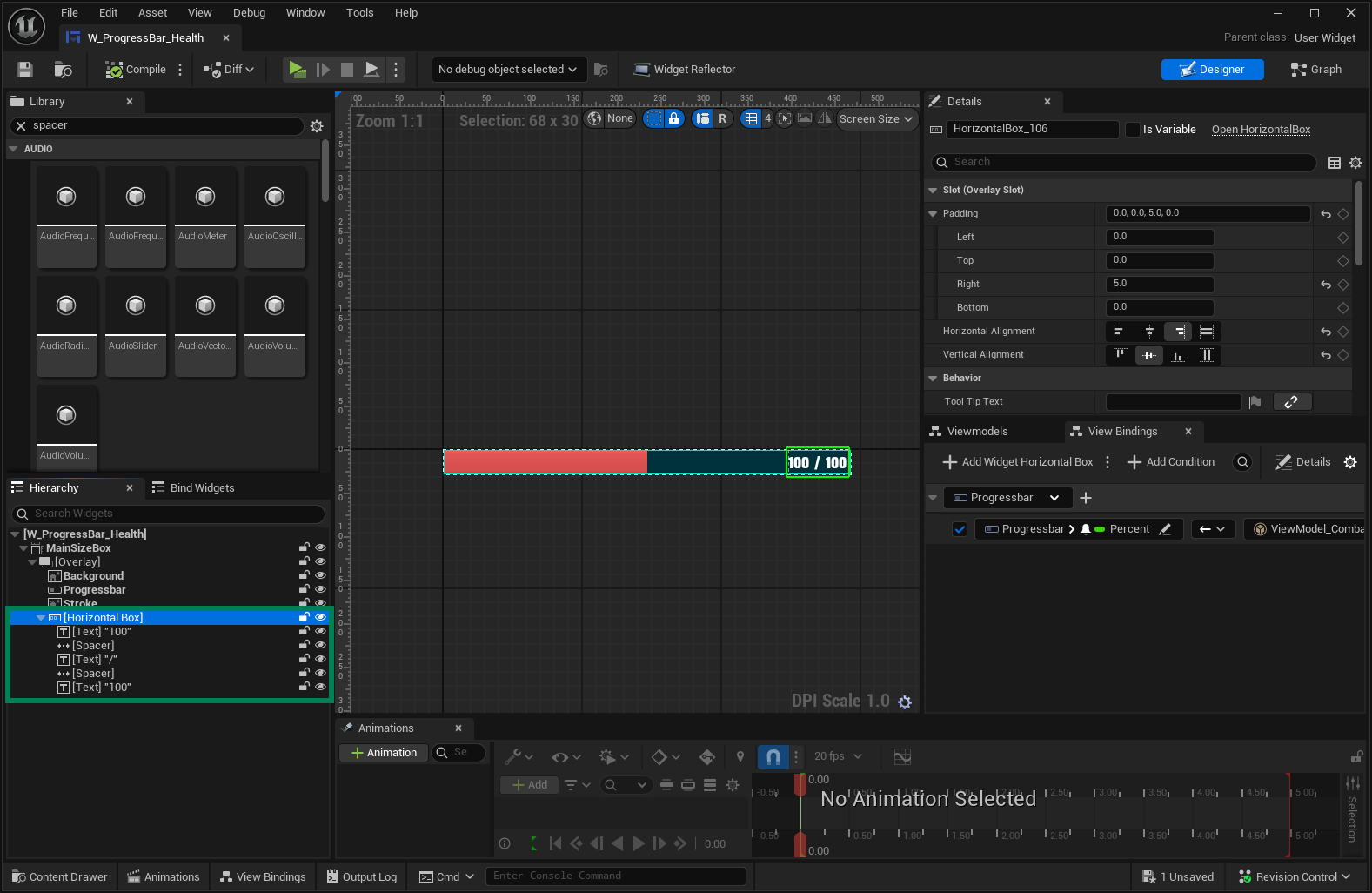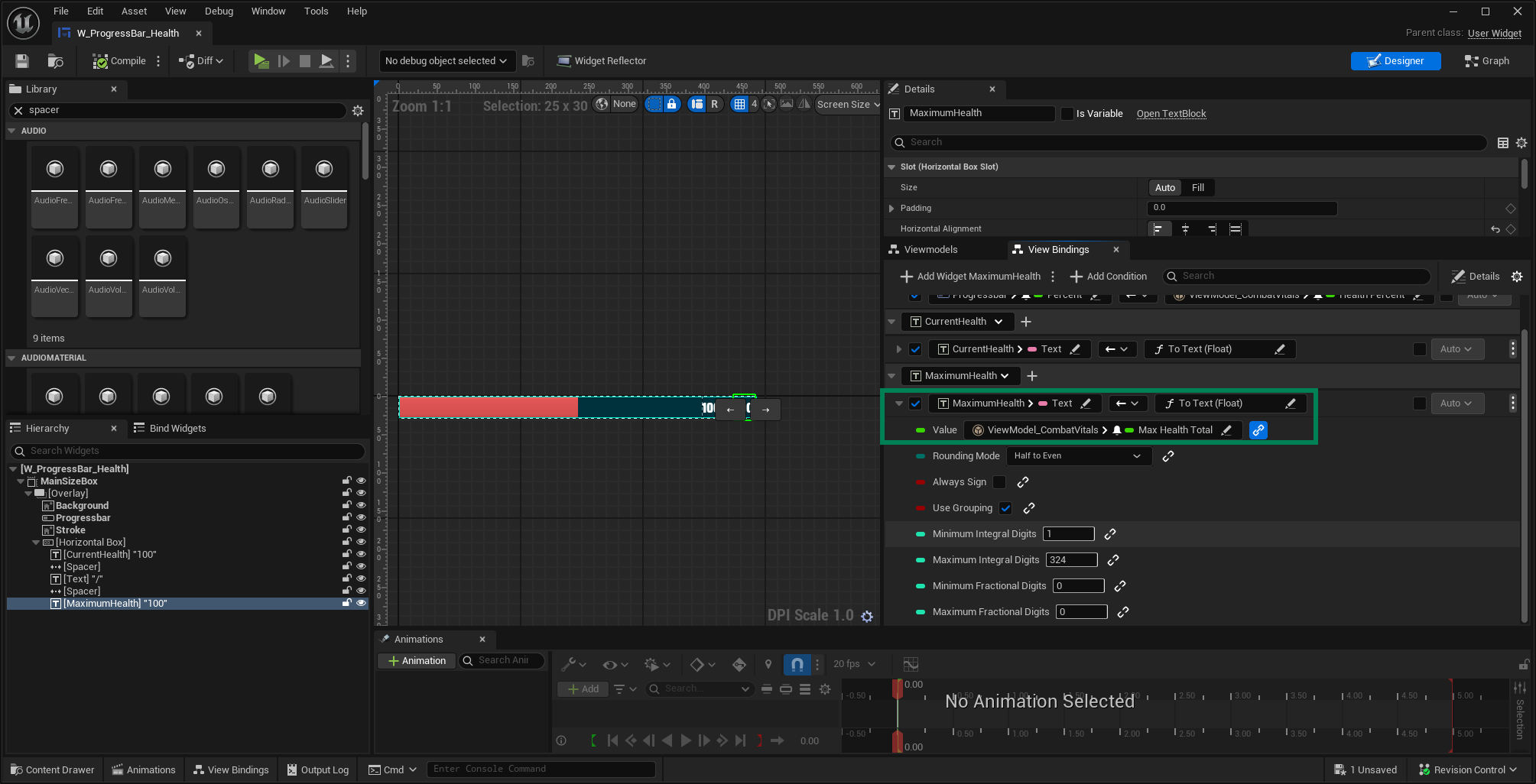User Interface
Representing combat data in the user interface is a common requirement for many games. Ninja Combat exposes relevant data using UMG ViewModels, Widget Components and Gameplay Effect UI Components.
This approach reduces the requirement on having any specific Widget hierarchy, allowing greater flexibility when choosing your own widget design and frameworks.
UMG ViewModels
ViewModels are a type of object provided by Unreal Engine, following the VMMV Pattern, which proposes a separation of the view layer - your widgets - from the model layer - the game.
In that design pattern, each layer does not directly reference the other. Collecting and transforming information, and exchanging it between both layers, is the responsibility of the ViewModel object.
Another advantage of ViewModels is the fact that they are reactive. Widgets are updated when ViewModels broadcast an update, which is different from the traditional UMG Property Binding that collects information on each frame, even if nothing has changed.
For more information about ViewModels in Unreal Engine, please check the official documentation
Using ViewModels
ViewModels are instantiated and used by widgets and can even be configured to exchange data between themselves. You can find a complete list of ViewModels available in Ninja Combat, but here are a few common usage examples:
Setting player vital attributes, using progress bars or text.
Displaying damage applied to enemies, including accumulating damage applied over time.
Tracking active Status Effects from Gameplay Effects applied to the player or to enemies.
Configuring a Player Health Bar
Create a widget with a progress bar that will be used to represent the player's health.

In the ViewModels tab, add the Vitals ViewModel to your widget and set its Creation Type to Resolver. Select the Ninja Combat ViewModel Resolver class.

In your widget Hierarchy panel, select the Progress Bar component. We will create a View Binding for it next.
In the View Bindings panel, click Add Widget, select the percent property from your Progress Bar, and bind it to the Health Percent property, from the Combat Vitals ViewModel.

You can also use Conversion Functions to perform common conversions such as float to text. Unreal Engine already provides many of these functions.
Converting Current and Maximum Health
In your Health Widget add Text Block components to represent the player's current and maximum health.

Create a View Binding for the Current Health, but using the To Text(Float) Conversion Function.
Configure the conversion details, binding the Value to the Current Health property, from the Combat Vitals ViewModel.

Repeat the steps for the Maximum Health Text Block, binding it to the Max Health Total property, from the Combat Vitals ViewModel.
Combat Resolver
As mentioned above, combat widgets should be initialized using the Ninja Combat ViewModel Resolver class. This class will collect the current Widget Owner - the player - and set it to Combat ViewModels, so they can perform any initialization task needed.
Widget Component
In cases where the ViewModel should be initialized to another combatant, such as an enemy for an overhead widget, you can use the provided NinjaCombatWidgetComponent.
Once the component's widget is initialized, it will call InitializeCombatViewModel on all hosted ViewModels, passing the component's owner, so the ViewModels can initialize to that new actor.
ViewModel Reference
Ninja Combat includes a collection of ViewModels that can be used in your project. They are all created following the same MVVM structure and can be extended to support additional combat data.
Combat Vitals
The Combat Vitals ViewModel exposes the character’s primary resources (Health, Stamina, Magic), including their current values, maximum totals, and percentages.
Property | Description |
|---|---|
Is Dead | Indicates whether the character has died (when health reaches 0). |
Health | Current Health. |
Health Percent | Health percent in [0, 1] range. Useful for Progress Bars. |
Max Health Total | Total Health, including bonuses. |
Stamina | Current Stamina. |
Stamina Percent | Stamina percent in [0, 1] range. Useful for Progress Bars. |
Max Stamina Total | Total Stamina, including bonuses. |
Magic | Current Magic. |
Magic Percent | Magic percent in [0, 1] range. Useful for Progress Bars. |
Max Magic Total | Total Magic, including bonuses. |
Combo State
Exposes information about the combo state for the owning combatant.
Property | Description |
|---|---|
In Combo Window | Informs if the character's combo window is open. |
Combo Count | Current Combo Count. |
Damage
Exposes information about the last damage received and additional details about it. You can display Last Damage Received as-is, or bind it to a function to accumulate damage over time.
Property | Description |
|---|---|
Received Blocked Hit | Informs if the last hit was blocked. |
Received Breaker Hit | Informs if the last hit has broken the blocking state. |
Received Critical Hit | Informs if the last hit was a critical hit. |
Received Fatal Hit | Informs if the last hit was fatal. |
Received Staggering Hit | Informs if the last hit was staggering. |
Last Damage Received | Amount of damage applied from the last hit. |
Poise and Stagger
Exposes information about poise and stagger. You can also track the Stagger state using the Status Effect view model, which might be a better choice, if you don't need to expose any information about poise.
Property | Description |
|---|---|
Is Staggered | Indicates if the character is currently staggered. |
Poise | The current Poise value available in the Attribute Set. |
Poise Damage | Current Poise Damage applied. |
Poise Recovery | How much poise is recovered. |
Poise Recovery Interval | How fast poise is recovered. |
Poise Percent | The percentage of poise remaining before a stagger occurs. |
Stagger Duration | Duration of the stagger effect. |
Status Effects
Provides a list of Status Effects assigned to the owner's Ability System Component. Entries are the FActiveGameplayEffect type and will include any Gameplay Effect that contains a UI Data Component of type GameplayEffectUIData_CombatStatus.
The GameplayEffectUIData_CombatStatus can expose information such as icon, display name, and remaining time, depending on how it's configured. You can access this data in your widget and render it as needed.
Property | Description |
|---|---|
Active Status Effects | Provides all status effects relevant to the Combat User Interface. |
Target Lock
Informs if the current target is targeted by the HUD owner (the Player). Useful for enemies showing some indication that they are locked by the current player.
Property | Description |
|---|---|
Is Locked By HUD Owner | Informs if the combatant is the locked target for the HUD/widget owner. |